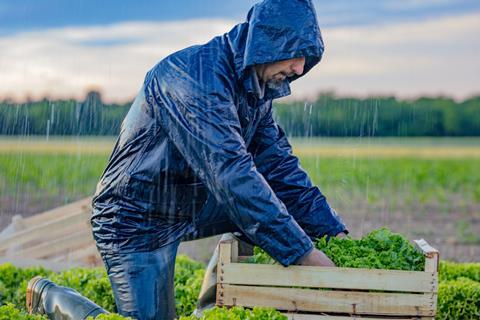UK food security threat as Met Office unveils climate impact

Climate change is “wreaking havoc” with the UK’s food security, experts have warned, as the full scale of the impact of warming weather on UK food production is revealed.
The Met Office’s State of the UK Climate report, unveiled on Thursday, showed 2023 was the second-warmest year in record, while also bringing about record levels of rain.
°Only 2022 was warmer than last year, with the UK seeing sharp increases in the number of “warm” days (maximum 25°C), “hot” days (28°C) and “very hot” days (30°C) for the most recent decade (2014-2023) compared with 1961-1990.
The number of “hot” days has more than doubled over that period, while the number of ”very hot” and “extremely hot” days has more than tripled.
The UK also recorded its warmest June on record by a wide margin in 2023, as well as the joint warmest September on record.
At the same time, 2023 brought a series of storms, flooding and rising sea levels, all of which severely affected food production and harvests of crucial goods such as potatoes and onions.
The number of flood warnings on England’s best farmland during the winter hit a record high of over 1,000, exceeding the previous record by a fifth, according to recent analysis by the Energy & Climate Intelligence Unit (ECIU) of Environment Agency flood warnings and alerts data.
“This report brings into sharp relief just how much impact climate change is having now on the UK,” said Tom Lancaster, land, food and farming analyst at the ECIU.
“For farmers who had to contend with the most active start to a storm season on record, this will come as no surprise.”
Last winter’s extreme wet weather “locked farmers out of their fields as crops were left to rot”, he noted. The ECIU expects this year’s harvest to slump by as much as a fifth after many farmers failed to get their crops established in 2023.
Met Office scientists found that ”human-induced climate change” had made extreme weather events ”much more likely to happen than they would have been in a natural climate”.
The UK seeing more frequent periods of hot weather was “bringing challenges for infrastructure, health and wellbeing”, they warned.
Yet scientists predict this year will be a “cool year” compared with 2100, under current predictions for the warming planet.
Food and farming is one of the largest contributors to global warming, with recent ECIU analysis showing progress on emissions reductions for the sector in the UK is significantly off target.
Progress lags behind other sectors to such an extent that “it is possible the sector could be the biggest emitter by the middle of the 2030s”, experts said.
“Farmers will need more support now to adapt, and build more resilience to floods, drought and extreme heat, and Defra’s new green farming schemes are a key part of this,” Lancaster said.
“But adapting to these extremes is not a long-term plan. The only way we can guarantee our food security against the impacts revealed in this report is to get to net zero emissions to stop climate change worsening.”
Gareth Redmond-King, head of international programme at ECIU, added: “Our country is getting hotter and wetter, faster. The fingerprints of climate change are all over that, as they are on more frequent and more intense extreme weather in all parts of the world.
“Acting to get to net zero emissions quickly is the only way of halting the growing danger. But we need to adapt as well, at home and abroad.
“As we look ahead to UN climate talks at the end of the year, countries will be expected to provide more support for poorer states struggling with climate extremes: help which, ultimately, is in all of our interests – protecting livelihoods, security and our international food supply chains.”















































